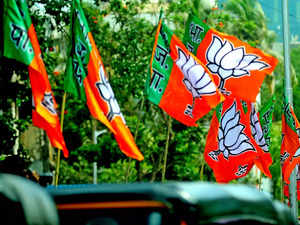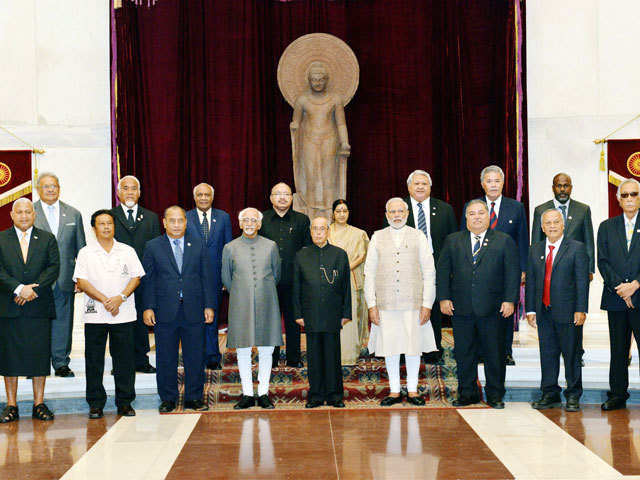Prime Minister Narendra Modi embarked on a groundbreaking visit to Papua New Guinea, becoming the first Indian premier to set foot on the island nation. The visit aims to bolster India’s engagement with Pacific leaders as a strategic move to counter the growing regional influence of prime Minister Modi landed in Port Moresby, the capital of Papua New Guinea, shortly after 10 PM local time. In an extraordinary display of respect, Papua New Guinea Prime Minister James Marape broke protocol by touching Modi’s feet upon his arrival. This gesture highlighted the profound impact of India’s growth and influence under the leadership of Prime Minister Modi.
The main focus of the visit is the Summit of the Forum for India-Pacific Islands Cooperation (FIPIC), scheduled for Monday. Prime Minister Modi, alongside Marape and other Pacific island leaders, will co-host this significant summit. The forum serves as a platform for strengthening cooperation between India and Pacific island nations.
Symbolic Diplomacy: Analyzing Marape’s Gesture and BJP’s Response
The Bharatiya Janata Party (BJP) reacted positively to the remarkable gesture of Prime Minister Marape. Sambit Patra, a national spokesperson for the BJP, hailed it as a testament to India’s growth and influence. Jaiveer Shergill, another BJP spokesperson, echoed the sentiment, emphasizing that India’s strength and respect in the world are evident under Prime Minister Modi’s visionary leadership.
Filmmaker Vivek Ranjan Agnihotri also expressed pride in the warm reception given to Prime Minister. The act of touching feet symbolizes the immense love, confidence, and respect for India that Modi brings home.
Expressing gratitude for the exceptional receptio

n, Prime Minister Modi tweeted his appreciation to James Marape for the special gesture. He expressed his eagerness to strengthen India’s ties with Papua New Guinea, acknowledging the significance of this historic visit.
Despite the customary practice of not offering ceremonial welcomes after sunset, Papua New Guinea made a special exception for Prime Minister Modi. His arrival was marked by a grand ceremonial welcome, including a 19-gun salute and a guard of honor.
The Indian community in Papua New Guinea also extended a warm reception to Prime Minister , underscoring the strong bond between the two nations.
The highlight of the visit is the third FIPIC Summit, which will bring together leaders from 14 Pacific Island Countries (PIC). This convergence of leaders is a rare occurrence due to connectivity and logistical challenges faced by the region. Cook Islands, Fiji, Kiribati, the Republic of Marshall Islands, Micronesia, Nauru, Niue, Palau, Papua New Guinea, Samoa, Solomon Islands, Tonga, Tuvalu, and Vanuatu are among the countries represented at the summit.
The launch of FIPIC took place during Prime Minister Modi’s visit to Fiji in 2014, emphasizing India’s commitment to deepening ties with Pacific island nations. The summit serves as a crucial platform to address common concerns and explore avenues for enhanced cooperat. ime Minister will engage in bilateral talks with Prime Minister James Marape and hold a meeting with Bob Dadae, the Governor General of Papua New Guinea. Additionally, he is scheduled to meet New Zealand Prime Minister Chris Hipkins, further strengthening India’s ties with the Pacific region.
ime Minister will engage in bilateral talks with Prime Minister James Marape and hold a meeting with Bob Dadae, the Governor General of Papua New Guinea. Additionally, he is scheduled to meet New Zealand Prime Minister Chris Hipkins, further strengthening India’s ties with the Pacific region.
Prime Minister Modi’s visit to Papua New Guinea assumes great significance as India seeks to counterbalance China’s increasing military and diplomatic influence in the region. The engagement with Pacific leaders reflects India‘s commitment to fostering strong partnerships and enhancing regional stability.
As Prime Minister Modi’s visit unfolds, it reaffirms India’s strategic focus on the Pacific and paves the way for deepern collaboration, mutual growth, and shared prosperity between India and the Pacific island nations.
International Relations in the Spotlight: Papua New Guinea’s Marape and PM Modi’s Meeting
Furthermore, Siddaramaiah’s commitment to improving the public’s experience extends beyond traffic management. He has also made a significant decision to decline garlands and shawls presented by the public during his official engagements. Instead, he encourages well-wishers to express their love and respect by offering books. This unique request not only reflects his personal preference but also highlights his commitment to fostering a culture of knowledge and education among the people.
By redirecting the public’s gesture of appreciation towards books, Siddaramaiah aims to create a lasting impact by promoting literacy and intellectual growth. This shift in approach showcases his innovative thinking and determination to make a tangible difference in the lives of the citizens of Karnataka. It also signifies a departure from the conventional practices associated with public ceremonies and events, emphasizing his vision for a more meaningful and enduring form of engagement with the public.
By redirecting the public’s gesture of appreciation towards books, Siddaramaiah aims to create a lasting impact by promoting literacy and intellectual growth. This shift in approach showcases his innovative thinking and determination to make a tangible difference in the lives of the citizens of Karnataka. It also signifies a departure from the conventional practices associated with public ceremonies and events, emphasizing his vision for a more meaningful and enduring form of engagement with the public.
Siddaramaiah’s progressive measures come in the aftermath of his recent swearing-in as the Chief Minister of Karnataka. The inclusion of eight Congress MLAs, including Priyank Kharge, the son of party boss Mallikarjun Kharge, and former Deputy Chief Minister G Parameshwara, underscores the government’s commitment to competent and inclusive leadership. The remaining ministers sworn in, namely K H Muniyappa, M B Patil, K J George, Ramalinga Reddy, and B Z Zameer Ahmed Khan, bring with them a wealth of experience and expertise, positioning the government to effectively tackle the diverse challenges faced by the state.
As Siddaramaiah embarks on his tenure as Chief Minister, his decisions to forgo the “zero-traffic” privilege and reject garlands signify his unwavering commitment to the welfare of the public. By prioritizing convenience and intellectual pursuits, he sets an example for other leaders, highlighting the importance of a people-centric approach to governance. This bold and thoughtful stance resonates with the aspirations of the people and heralds a new era of governance focused on inclusivity, accessibility, and progress.
As Karnataka embraces this paradigm shift in leadership, it is hoped that Siddaramaiah’s initiatives will inspire a broader transformation in the way politicians engage with their constituents. By listening to the needs and concerns of the people and taking proactive steps to address them, leaders have the power to build a society where the welfare and aspirations of citizens take center stage. Siddaramaiah’s visionary actions provide a promising foundation for a brighter future for Karnataka, where the government’s primary focus remains the well-being and progress of its people.
